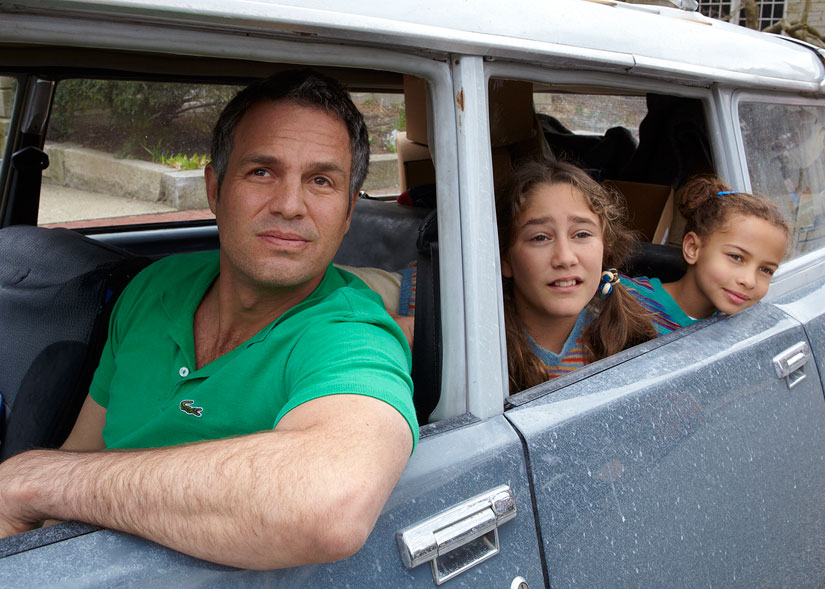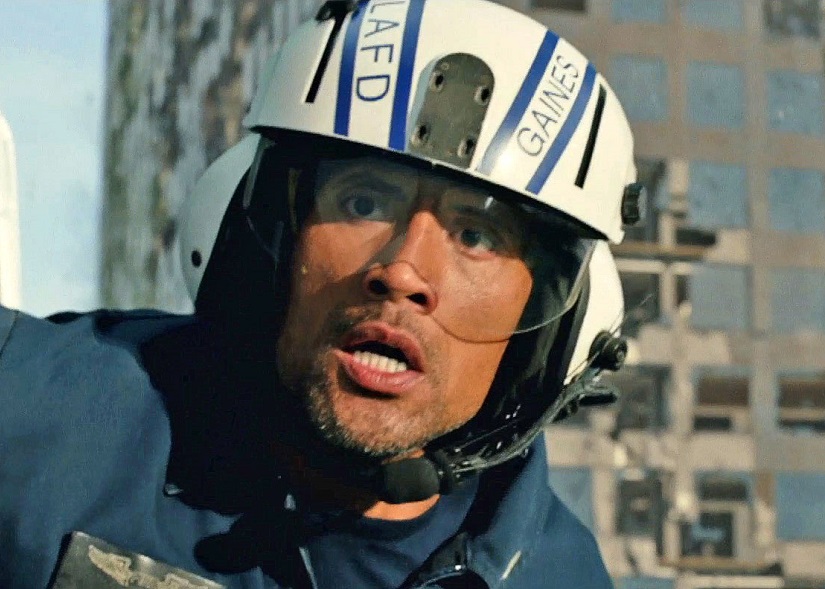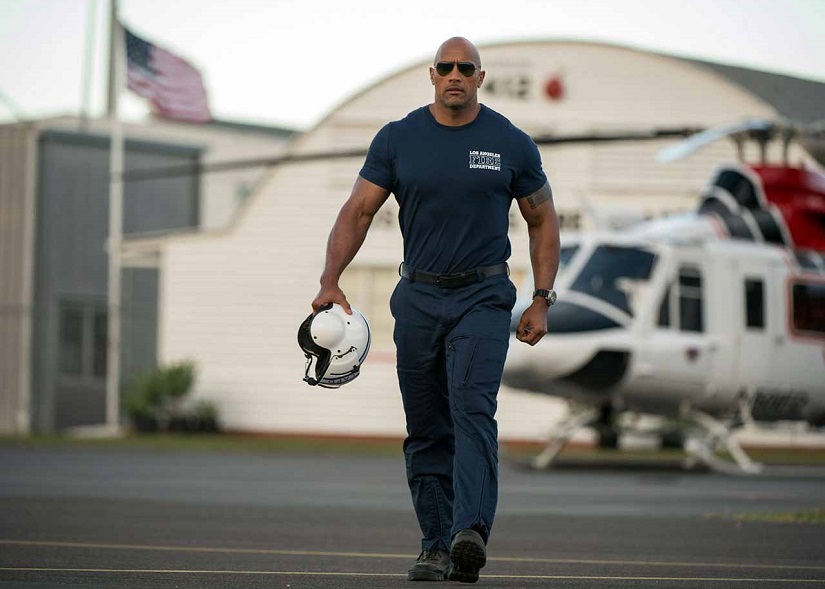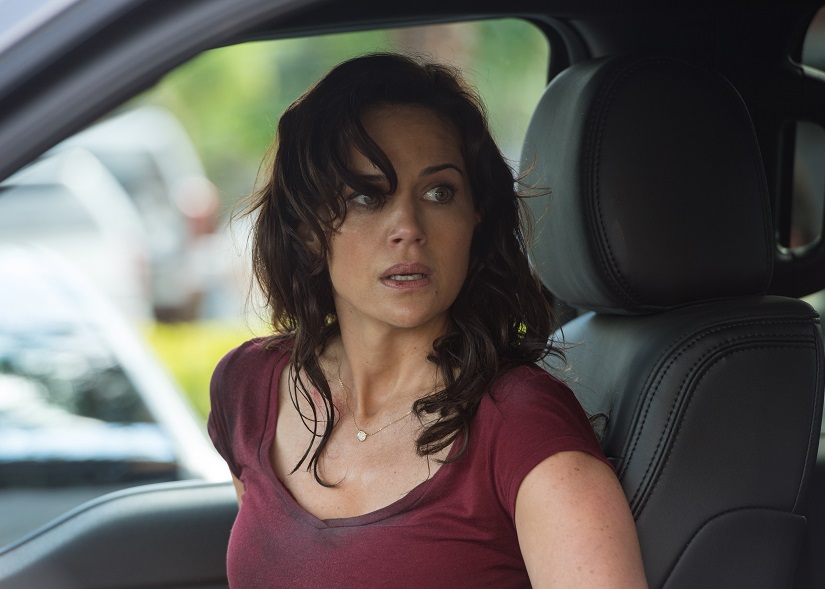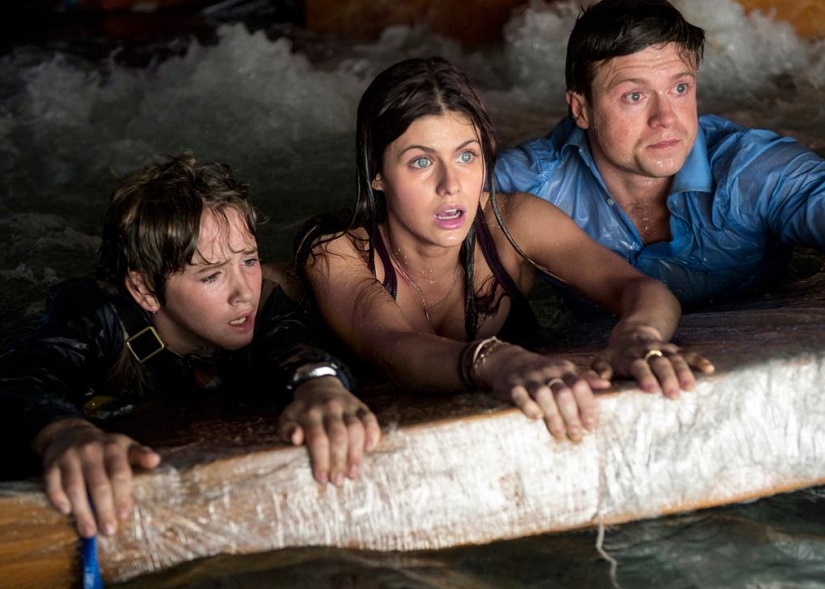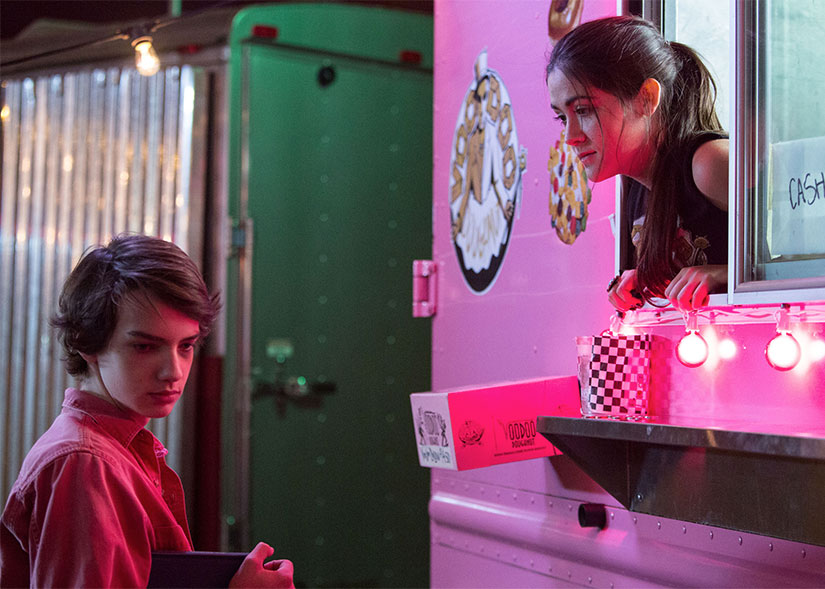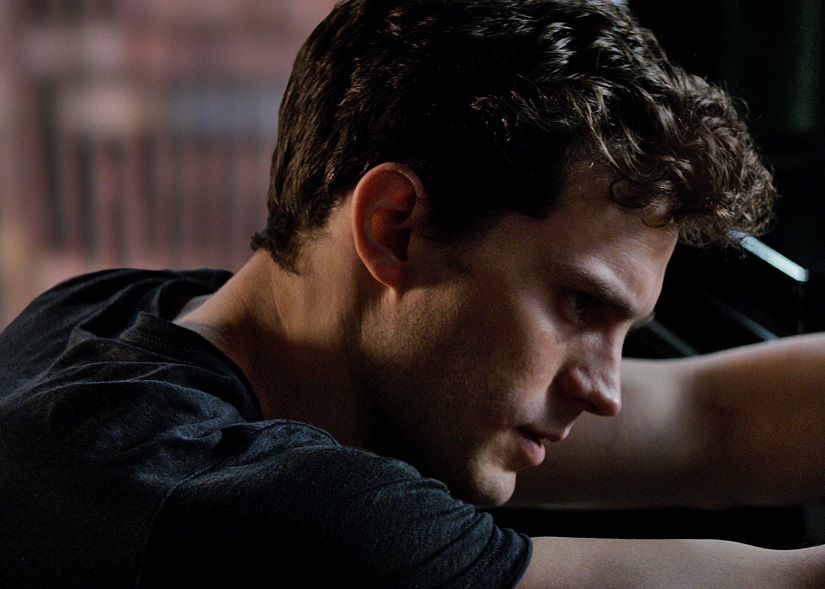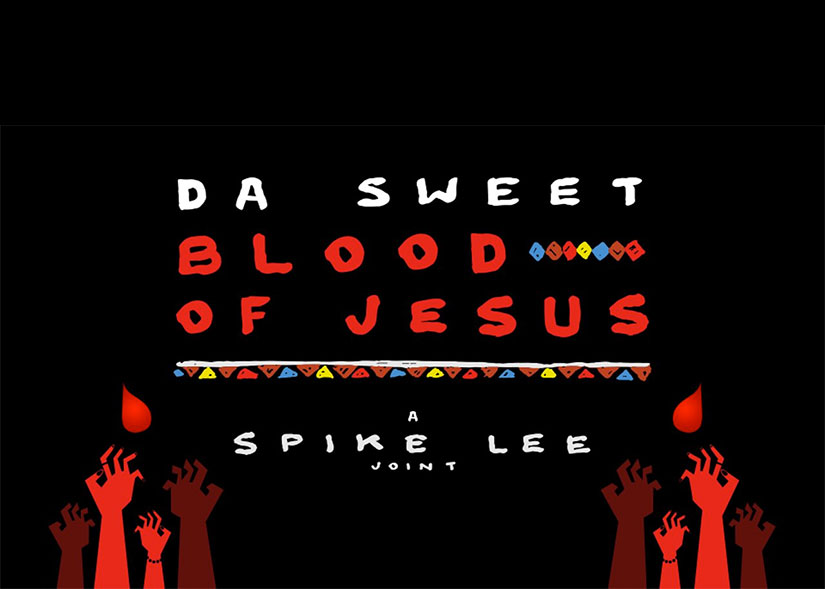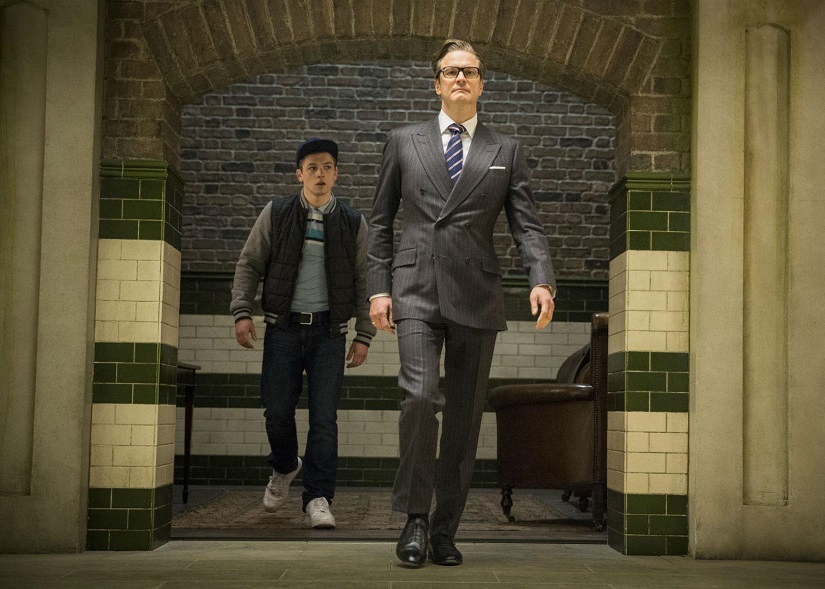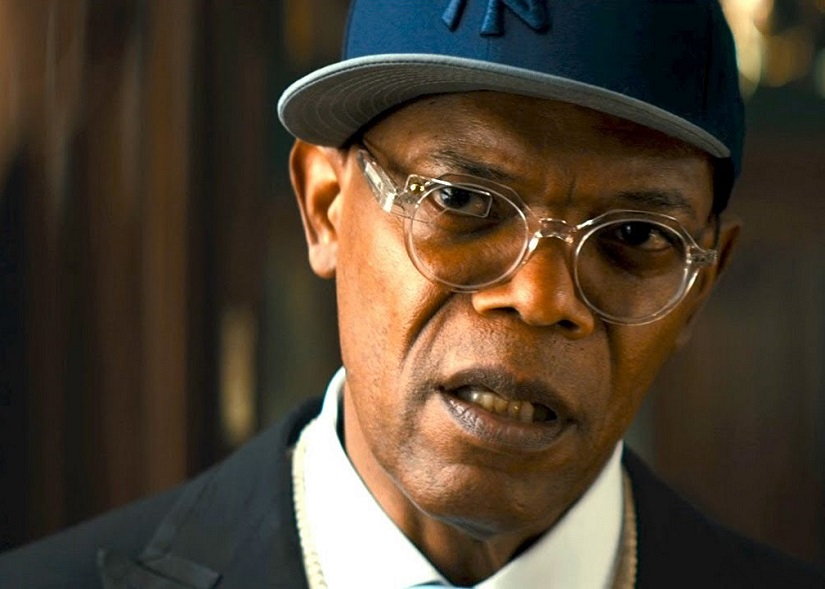[Review] Infinitely Polar Bear
[This review was originally published during our Sundance 2014 coverage. It's being re-posted to coincide with the film's limited theatrical release.]
Infinitely Polar Bear
Director: Maya Forbes
Rating: N/A
Release Date: January 18, 2014 (Sundance), June 19, 2015 (limited)
Infinitely Polar Bear is based on writer/director Maya Forbes' childhood, so it's hard to say what I have to say about the film without an internal pang of guilt surrounded my honesty. To be critical of a film is hard when the film is a representation of a person's real life, and while I've been able to deal with the separation more often than not in the past, I find myself torn as I write this. Consider this paragraph my cold opening for a film that, despite its every attempt to warm my heart, left me feeling chilly.
Cam Stuart (Mark Ruffalo) is a manic depressive father of two who's estranged from his wife, Maggie (Zoe Saldana). After a severe breakdown hospitalizes Cam, Maggie and their daughters Amelia (Imogene Wolodarsky) and Faith (Ashley Aufderheide) are forced to move from their idyllic country home to the city due to Cam's bills. As his health gradually recovers, Maggie finds herself in a growing financial rut. Her best bet is to leave Boston to attain her Master's Degree in New York, entrusting the care of the girls to Cam. What transpires is a test of emotional and psychological strength as Cam and the girls attempt to build and maintain a healthy family dynamic.
Infinitely Polar Bear is a feel-good film, but is sometimes too much at times. Cam's manic depression is treated more as weird tics and character quirks than a real affliction. Is this due to artistic license? Perhaps this is how Forbes saw her own father? We all cope and deal with problems differently, and this could simply be a case of that, but the film downplays Cam's affliction as a cute eccentricity.
Despite that, Ruffalo's performance in Infinitely Polar Bear is probably my favorite of his in recent years. He plays Cam loose, and it fits into the context of the film. Other reviews I've seen elsewhere have characterized his Cam as a manic pixie guy (alluding to the "manic pixie girl" archetype that has arisen in films over the past decade), and I can't argue that. Again, it fits into the film well, but when the crux of the film involves this man's manic depression and how it affects the relationships he has with his family, you'd expect more depth and emotional toil than what's depicted.
[Review] The Overnight
[This review was originally published during our Sundance 2015 coverage. It’s being re-posted to coincide with the film’s limited theatrical release.]
The Overnight represented a change of pace for my Sundance 2015 coverage as the first comedy of the week amidst an onslaught of dramas. Featuring a stellar cast comprised of Taylor Schilling (Orange is the New Black), Jason Schwartzman (The Grand Budapest Hotel), Adam Scott (Parks and Recreation), and Judith Godreche (Stoker), The Overnight is a well-told comedy that utilizes a plot twist the likes of which M. Night Shyamalan could never accomplish.
The Overnight
Director: Patrick Brice
Rating: N/A
Release Date: January 23, 2015 (Sundance), June 19, 2015 (limited)
Making new friends as adults and parents can be difficult sometimes, especially when moving to a big city like Los Angeles, as Alex (Scott) and Emily (Schilling) discover. However, during a trip to the park, Alex’s son RJ (R.J. Hermes) befriends another boy, Max (Max Moritt), which leads to his father, Kurt (Jason Schwartzman), to introduce himself to the couple. After sensing something special within them, Kurt invites Alex and Emily over for dinner that night. As the night progresses and the liquor pours, Alex, Emily, Kurt, and Kurt’s wife Charlotte (Godreche) begin to form new bonds. However, things slowly begin taking a sinister turn as Alex and Emily soon realize Kurt and Charlotte might have ulterior motives for inviting them over.
The casting in The Overnight is spot-on with each actor fitting into their roles perfectly. Scott plays to type with the innocent, naïve Kurt, Schilling plays the strong, guarded Emily, Schwartzman plays the douchey but well-intentioned Kurt, and Godreche plays the sexy, sultry Charlotte. Each actor plays off each other well, especially when Scott and Schwartzman are given free reign to bounce off one another.
[youtube id="QoN2F22eUBA"]
The comedy in The Overnight is a bit raunchy, but not to Apatow levels. However, in saying that, expect some cod pieces and a plethora of pubic hair (too much, if you ask me). The visual gags are funny, sure, but as I mentioned earlier, the true humor is within the interaction between the cast. I’ve softened my stance in regards to Schwartzman over the past few years, and I think The Overnight helped me realize just how comfortable and proficient he is in playing wealthy, indulgent types while still being likable and relatable.
The Overnight is a different type of comedy that we see nowadays. It’s not too clever for its own good, nor does it rely on the raunchiness of its jokes. Rather, it combines the right amount of wit and perversion that anybody would enjoy.
[Review] San Andreas
Before watching San Andreas, I was curious to know how long it has been since the last genuine, unabashed big-budget disaster movie. Naturally, this meant the first port of call was the filmography of Roland Emmerich, the German director behind Independence Day and The Day After Tomorrow, whose career is virtually name-associated with the genre. As it turns out, his last true disaster movie (not to be confused with disastrous movies, of which he's released a couple since) was 2012 in, weirdly, 2009.
That was one year after the release of Iron Man, the movie which turned Marvel and the superhero movie into the face of the modern blockbuster. Given the mind-boggling destruction which the average comic book movie trades in - see Avengers: Age Of Ultron, or if you haven't by this point, don't bother - it's no surprise that the disaster movie has since fallen by the wayside. San Andreas feels like a throwback in that respect, but also very much conscious of the changing tastes of the time.
[youtube id="hnJPHYAlid8"]
San Andreas
Director: Brad Peyton
Rating: PG-13
Release Date: May 28th, 2015
Dwayne Johnson, aka The Rock, as anyone who ever had a childhood will know him, plays a helicopter rescue pilot who sets out to reunite his family when the biggest earthquake in human history hits California as a result of the San Andreas fault starting to shift. There's approximately nothing more to the plot than that. That's far from a criticism, however, as simplicity is a much undervalued quality at a time when every new release seems to burden itself with increasingly convoluted world-building and sequel-seeding. San Andreas tells a straightforward story, going from A to B without any deviations along the way, then ends with an actual conclusion. It's one of the genre's strengths and, at the present time, a welcome relief from the norm.
If you've watched the trailer - see above - you know what to expect. Buildings collapse, people run and scream, the hero overcomes a personal trauma to save the day, and a fulsome female lead runs around in a wet vest. All boxes ticked. What makes the movie more distinct from its forebears is the presence of The Rock, who is quite unlike any disaster movie protagonist in living memory. The genre typically trades in everyman heroes, rising above their own shortcomings to survive, often with the assistance of a team, an onslaught by the overwhelming power of mother nature. One look at The Rock tells you that's not going to be the case here. Trying to pass off a 6'3 former wrestler as an everyman isn't going to work, and it's interesting how his physique alters the fundamental dynamic of the relationship between the genre and its protagonist.
Unlike disaster movies past, San Andreas' protagonist is never the one in danger. At worst, there are instances where he looks a mite concerned, but he exists almost entirely beyond the reach of the disaster itself. It's his daughter, played by Alexandra Daddario (required to do nothing but be sweet and look attractive, tasks she rises to meet triumphantly), who is the one caught in the chaos and finding herself, along with a bland English boyfriend-in-waiting and his sarcastic younger brother, perpetually trapped under collapsing buildings and rooms rapidly filling with water. His ex-wife, played by Carla Gugino, momentarily finds herself in similar trouble, but is soon rescued to join Mr. The Rock for some relationship therapy as the entire West Coast of the United States crumbles around them.
The Rock's essential invulnerability gives San Andreas something of the superhero movie vibe. Surprisingly, this works quite effectively. One of the genre's biggest obstacles is that it needs to go bigger each time in order to retain the level of awe-inspiring visual spectacle on which it overwhelmingly relies for its entertainment value, yet as the likes of Avengers proves, there's a point at which wanton destruction becomes so ludicrous that it's hard to care anymore. With Mr. The Rock (his 'character' has a name, but it's not important since he's basically The Rock in a differently coloured tight shirt) effectively watching the catastrophe unfold in the same way as the audience, he becomes one of the genre's more effective surrogate characters in recent memory. This also makes his family drama with Gugino's Ex-Mrs. The Rock slightly more relatable, helped by the two actors playing it with a unexpected amount of sincerity.
What also works is that the movie doesn't shy away from the human cost of such a massive disaster. There are a handful of shots whose sole function seems to be showing people being wantonly taken out by falling debris and collapsing structures, which is perhaps a little tasteless (although if that's your main concern, you're watching the wrong genre) but also gives the destruction a palpable sense of weight and loss. It's not enough to redeem the tiresomely uncanny valley-ish CGI depictions of cities being swallowed, enflamed and/or flooded, but that commitment to showing the arbitrary cruelty of its disaster demonstrates a rare and admirable strength of conviction.
Existing entirely outside The Rock's immediate vicinity is Paul Giamatti's seismologist, whose character's name also feels unimportant since he's basically the stock Voice Of Authority Played By A Respected Character Actor. It's nevertheless odd how tangential to the story he is, even by the genre's standards, not sharing a single scene or communication with the three leads. He gets to run away from one disaster - saving a little girl and watching his ethnic minority colleague be sacrificed in a scene which leaves no cliché unturned - shortly and with no small sense of irony after predicting the inevitability of such an event, after which he's stuck delivering grave warnings into a television camera. While such roles are part and parcel of the genre, the time spent in his character's company feels very much like time-wasting (other than, perhaps, to dispel the myth that the best course of action in an earthquake should be to hide in a doorway, when under a table is in fact the better course of action), an impressive feat for a movie coming in under 2hrs long. I should probably post an image of Mr. Giamatti at this point, but if we're honest, I think if we'd all rather see Alexandra Daddario, so let's go with her.
While Giamatti's scenes are strictly disposable, conveying information which could just as easily by offered through radio broadcasts or other background noise, it's to San Andreas' credit that it otherwise cuts to the chase when it comes to reaching the big events that audiences will be paying to see. There's approximately no time for such inconveniences as logic, but again, if that's your concern then the genre is most definitely not right for you. Stuff happens entirely to fulfil audience expectations rather than real world, or even internal logic, and that's not a bad way to go about approaching this kind of material. The Rock has a singular goal, to reunite his family, and despite being a rescue pilot who has commandeered a helicopter at a time when one would assume all airborne vehicles to be invaluable rescue resources, has absolutely no interest in helping anyone other than two specific women, who rather helpfully, are the only two people he really comes across anyway. In one amusing scene, his ex-wife (who has, inexplicably, been lunching with Kylie Minogue) happens to be the very first person he sees upon flying into Los Angeles.
It's lightweight, disposable fare, easy to mindlessly absorb with friends and laugh about afterwards. As a genre turn, it's a perfectly solid one, occasionally edging towards poignance with its willingness to engage ideas of loss on both personal and wider scales. Despite the big budget, it's nevertheless difficult not to see its self-aware campiness as having been undercut to a large extent by the likes of Sharknado, itself even more unrestrained in its audience-pleasing ridiculousness. The Rock proves he can do solid work without the safety net of irony, nicely underplaying a protagonist whom audiences are expected to take at least somewhat seriously despite the events surrounding him. Gugino and Daddario are entirely serviceable in their limited parts and Ioan Gruffudd is suitably slimy as Ex-Mrs. The Rock's new husband, whose evilness is defined by his riches in a movie produced, directed, written by and starring presumably very rich people. Make of that what you will. Regardless, San Andreas is decent enough multiplex filler, a throwback with just enough tweaks to keep it interesting, if never exactly engaging. It's not exactly good, per se, but far from a disaster.
[Review] ANIMALS
[This review was originally posted as part of our SXSW 2014 coverage. It is being reposted to coincide with the film's wide release.]
[youtube id="ApqHI23JJHw"]
ANIMALS
Director: Collin Schiffli
Rating: N/A
Release Date: March 9, 2014 (SXSW), May 15, 2015 (Theaters/VOD)
There have been many films about addictions in the past. For most, the first that comes to mind is Darren Aronofsky's Requiem for a Dream, a dark, sometimes satirical look at the consequences of various forms of addiction. In a way, what helped make Reqiuem such a great film was how digestible the film was due to some of its outlandish, sometimes satirical tone. Sure, it was a dark and gruesome film, but it was somewhat sensationalized and over-exaggerated at times that helped hide or shield some of the more serious moments.
In ANIMALS, addictions are once again front and center, but they shape and characterize the love story between the film's two leads, Jude (David Dastmalchian) and Bobbie (Kim Shaw). The couple is homeless, living out of a car parked right outside of Chicago's Lincoln Park Zoo, as they spend their days running elaborate cons to fuel their opiate addictions. As their options for low risk cons begin to run dry, Jude and Bobbie must turn to shadier jobs to supplement their growing addictions that cause friction in the couple's relationship.
Throughout the film, there's a foreboding sense of despair swirling around Jude and Bobbie, as is often the case within films similar to ANIMALS. However, the manner in which it manifests isn't something inherently dark, unlike the fall in the aforementioned Requiem for a Dream, but something that fits within the context of the film. That's not to say the drama or suspense is suspended; rather, it's understated and kept grounded in a way that makes it feel more realistic and natural.
ANIMALS is loosely based on Dastmalchian's personal struggle with opiate addiction years ago, so the intimacy and reality of the situation is derived from an honest place that doesn't sensationalize any aspect of addiction, something I feel most other drug films do. ANIMALS might not find wide distribution, so if you get the chance to catch it at an indie or small run theater, I highly recommend catching it.
[Review] All the Wilderness
Indie films in which teenagers have to cope with the death of a close family member or loved one tend to be dark, moody films contrasting the loved one's death with the protagonist's "birth" (or "rebirth"). They're somewhat formulaic and predictable, with adventurous films utilizing the concept into a genre film. Nevertheless, it's hard to argue against how influential the impact of a death has on a teenager at a time when nearly everything in the world will have some bearing on creating who said teenager will become. While All the Wilderness does utilize the concept, the film separates itself from the pack with an entrancing soundtrack, perfect casting in Kodi Smit-McPhee, and cinematography that lends itself well to both Portland's urban and rural landscape.
[youtube id="FjuDhvPiaVg"]
All the Wilderness
Director: Michael Johnson
Rating: N/A
Release Date: February 20, 2015
Still reeling from his Dad's suicide, James (Smit-McPhee) has found himself fascinated with nature and death, occupying his time sketching illustrations of dead insects and animals into a notebook and telling another kid that he knows when he'll die. Worried about her son's development in the wake of the death, James' Mom (Virginia Madsen) makes him visit a shrink (Danny DeVito) weekly, and it's at his office that James meets Val (Isabelle Fuhrman), an alluring girl whom he is immediately drawn to. During one adventurous night in which James explores the "wilderness," he meets Harmon (Evan Ross), a street punk that immediately brings James into his circle. It's through Harmon and Val that James begins to find a new sense of self and identity
Smit-McPhee shines in All the Wilderness, living up to the accolades the actor has garnered in his already storied, but young career. In the wrong hands, James would have been a whiny brat; in Smit-McPhee's hands, rather, he's a multi-layered character inquisitive of his place in the world. The characterization is also thanks to the sound writing and direction from the debuting Michael Johnson. Alongside cinematographer Adam Newport-Berra, Johnson's story and vision examines all sense of the word "wilderness" by comparing and contrasting the vast woods near James' home to the squatter warehouse where Harmon lives and the wild, rebellious night life James is introduced to with the reserved, introverted life James spent prior to meeting Harmon. Accolades must also be shared for the film's soundtrack, which features Sonic Youth, Elliot Smith, and songs from Jonsi and Alex of Sigur Ros; if there were ever a soundtrack that was capable of capturing teenage melodrama that can also capture the atmosphere of a wild forest or city setting, this would be it.
All the Wilderness will appeal to indie film darlings that can't get enough of coming-of-age films (like myself). As mentioned earlier, Smit-McPhee continues to show growth and talent at a young age, and it's only a matter of time before he finds stardom (outside of his recent casting as Nightcrawler in the upcoming X-Men: Apocalypse). Writer/director Michael Johnson also shows promise with a strong debut.
[Review] Fifty Shades of Grey
I knew very little about Fifty Shades Of Grey going into the movie, other than it being about BDSM and that the book's prose was the subject of widespread derision. The latter point always seemed an odd one to me: reading erotica for the prose sounds a bit like watching porn for the art direction. It exemplifies an attitude of snobbishness which continues to permeate criticism of the arts in all media. By most accounts, plenty of women found the book an entirely pleasurable experience. It must have been doing something right.
As you've probably worked out by now, that kind of introduction is only heading in one direction, so I'll just out and say it: look past the upturned noses and Fifty Shades Of Grey is not only a perfectly decent movie, but wittier and more subversive than many would have anticipated.
[youtube id="SfZWFDs0LxA"]
Fifty Shades Of Grey
Director: Sam Taylor-Johnson
Rating: R
Release Date: February 14, 2015
Were you expecting a bodice-ripping, dick-swinging, ass-pounding, ball-squeezing, face-sitting, vaginal-fisting extravangza, Fifty Shades is not it. The fact the movie made it to cinemas should have told you that much, and besides, in the event of disappointment, there's always YouPorn. Though there's a cursory amount of whipping, some tied hands and quite a bit of moaning, director Sam Taylor-Johnson consciously shifts away from anything resembling exploitation. It is best described as a sex-themed character drama, more concerned with subverting screen representations of male and female sexuality, when they exist at all, than utilising them for blunt titillation. There's a reasonable amount of sex, but artfully shot and with one eye clearly aimed at meeting the requirements of the R rating. Only Anastasia shows anything provocative, though given how close a few of cuts are to Christian's crotch, the feeling pervades that this is more the result of institutional sexism at the certification boards rather than willing self-censorship.
Even so, the flashes of pubic hair from both lead characters feels satisfyingly liberated compared to the sterility afflicting your average blockbuster. The imbalance in what the movie is allowed to show does have the side-effect of slightly shifting the movie's gaze towards Anastasia rather than Christian, where it should be, but this is nevertheless the rare movie which emphasizes female pleasure first and foremost. True, it's mostly through bitten lips and sensual gasps, but remains a heck of a lot better than anything else Hollywood has provided in recent decades. Fears about Anastasia's position as the submissive in the relationship are also ill-founded: consent is not only a key concern for Christian, but to such an extent that it almost circles around to satirising the challenges of tackling that topic in real-life. Ana's distaste for the consent contract which Christian is desperate for her to sign can't help but nudge, if accidentally, towards the inherent hypocrises of 'yes means yes' laws.
The fact Fifty Shades is the rare Hollywood movie where the entire creative team is female makes its even-handed treatment of gender and sexual expectations all the more poignant. This is a movie where a woman inhibited by her sexual shame meets a man imprisoned by his and through pushing the limits of their sexual and emotional horizons, begin unearthing each other's buried humanity. Dakota Johnson is a revelation as the meek but quietly intelligent Ana, bringing considerable pathos and underlying strength to the role as the character gradually learns to assert herself in bringing her relationship with Christian onto her terms even while acting as his submissive. The movie may offer the tamest possible representation of BDSM, but understands the seemingly contradictory principles at its core (pleasure through pain, liberation through abandonment of control) and neatly weaves them into its character arcs. It may not be particularly subtle, but it works.
As Christian, Jamie Dornan struggles to make much of an impact beyond, to judge by the panting admiration of the girls sitting behind me, the not inconsiderable appeal of his toned body. Christian is tormented by his obsession with control and how Ana challenges his refusal to engage with women on anything other than the terms of a contractually defined relationship. Dornan is a little too baby-faced and young to authentically sell the character's depth of sadness and anger, leading to his brooding seeming a little too practiced and pouting to make his inner turmoil completely believable. Were the movie more geared towards the mostly implied eroticism, his aesthetic appeal would be more than enough. With emphasis instead placed on the character drama, his struggles make Christian more frustrating than enigmatic and restrain - and not in the fun way - his chemistry with Dakota Johnson.
Also frustrating is the movie's status as the first entry in a planned trilogy. After a lively opening, the pace drags considerably during the middle act with a few too many repeated 'why don't you let me in' conversations and family drama which emphasizes Ana's homespun nature but gets mighty tedious while doing so. The cliffhanger that concludes the movie, while an important moment for Ana, feels like it should have arrived at roughly the halfway or three-quarter point rather than being spun out into an entirely unsatisfactory ending (reaction of the girls behind me: "What? Is that it?"). It's even more of a shame because the movie cuts off just as both characters seem on the verge of a breakthrough without having quite crossed the threshold. A dinner-slash-business meeting between Ana and Christian, wonderfully lit in lurid orange, marks the beginning of the final act and is a noteworthy highlight for finding the perfect balance between tension, humour and engaging character work.
That the movie never quite finds that level of cohension again is a shame, because its individual elements are played with unexpected consideration and, occasionally, tenderness. It's easy to see why the story has connected so strongly with such a large audience, bringing together as it does the essential clichés of arguably the two most widely beloved female-appealing stories - Cinderella's prince and the ingenue dynamic, plus Pride & Prejudice's reserved, Byronic love interest - and twisting them into something at once dark but modern, open-minded and gently empowering. Sure, you can criticise the unmemorable dialogue (sadly, only one 'holy cow!' and not a single 'oh jeez!'), the repetition of several narrative beats, cheesy use of soundtrack and a meandering middle act, but submit yourself without inhibitions and you may be surprised how much you enjoy the experience.
[Review] Da Sweet Blood of Jesus
Following a troubled production for 2013's Oldboy that saw Lee's cut of the film cut and edited to remove 35 minutes, resulting in the film being deemed a "Spike Lee Film" rather than his patented "Spike Lee Joint," the famed director turned to Kickstarter to find funding for his next film, Da Sweet Blood of Jesus. Free from the typical studio workings, the film could have been exactly what Lee needed to express himself with full creative freedom. Instead, Da Sweet Blood of Jesus is a mediocre film that shows Lee may not be able to re-capture the energy and excitement that jumpstarted his career.
[youtube id="n739-zHeooQ"]
Da Sweet Blood of Jesus
Director: Spike Lee
Rating: N/A
Release Date: February 13, 2015
Dr. Hess Green (Stephen Tyrone Williams) is a wealthy anthropologist researching the Ashanti Empire that comes across a fabled Ashanti dagger. During one strange night, Hess's assistant, Lafayette Hightower (Elvis Nolasco), stabs Green multiple times in the chest. Guilt-ridden by the apparent murder, he commits suicide; however, Green awakens hours later, sensing something changing within him. As the days progress, Hess finds himself drawn to blood, convincing women to have sex with them, just to murder them right as intercourse is about to begin, drinking up their blood. When Hightower's widow, Ganja Hightower (Zaraah Abrahams) arrives at Martha's Vineyard to relocate her husband, both she and Hess are inexplicably drawn to one another, leading to her eventual discovery of Hess's secret.
Da Sweet Blood of Jesus is a reinterpretation/reimagining of the 1973 blaxploitation film, Ganja & Hess, which explored themes of addiction through the framework of a vampire film. While exploring the addiction element, Lee's modern reimagining also centers on wealth and privilege. However, whereas the former film was praised for its thematic explorations through the lens of the vampire/horror genre, the latter loses focus and is never really clear about what it's attempting to come across to its audience.
Central to the film is Hess's undeniable wealth, buoyed by his large collection of African art and his residence on Martha's Vineyard. However, beyond the flashes of wealth and status, nothing is ever really said about it. As someone who's willing to analyze sociopolitical issues like wealth and poverty, Da Sweet Blood of Jesus feels like a missed opportunity to provide commentary on the subject, save for a brief party scene. Instead, the film focuses on the "Is he or isn't he?" element of Hess's transformation into a "vampire." Without using the V-word, the film hones in on his newfound addiction to blood and pairs this together with his sexuality. As started earlier, Hess turns his victims by first seducing them, creating a parallel between his literal insatiable thirst for blood with the more figurative taste for sex, creating an extra layer of depth to the film that desperately needs it.
However, save for Abarahams' presence and her humorous interactions with Rami Malek, who plays Hess' live-in servant Seneschal Higginbottom, Da Sweet Blood of Jesus feels shallow, vapid, and lifeless. with no real sense of direction. In the 40 years since Ganja & Hess premiered, an endless number of films have tackled addiction, social issues, and genre alike in fresh and exciting ways. Lee's attempt, however, just feels uninspired and lacking any true motivation. Whatever it is Lee wanted to say with Da Sweet Blood of Jesus is lost somewhere in the mix amongst ill-used modern songs and a soundtrack from Bruce Hornsby that further alienates the film's focus.
A lot of criticism has been cast on established actors and filmmakers who turn to crowdfunding platforms like Kickstarter to fund their films, as they're targeting fans of their work who may not be able to afford the $20 or so donation, but would like to directly contribute to their favorite actors or directors. However, without the pressures of a studio, Da Sweet Blood of Jesus could have been the perfect opportunity for Lee to shake off 2013's disastrous remake of Oldboy and to find his own voice. Instead, the film is more like a student film or Lifetime special that is never able to find itself.
That's not to say Da Sweet Blood of Jesus doesn't try to reach a level that will touch audiences on a deeper level; rather, it just never quite succeeds at it. Lee should be applauded for not only giving homage to a pivotal film, but for also spreading his wings and exploring new opportunities in film. However, I'm sure I speak for everyone when I say I wish he would focus on what he knows and has proven to be successful at.
[Review] Kingsman: The Secret Service
Director Matthew Vaughn and screenwriter Jane Goldman's working relationship has to date produced four movies, three based on comic books, all of which have offered a similar set of strengths and flaws. Kingsman: The Secret Service is the latest off the production line and the most succinct review I can offer is that if you enjoyed Kick-Ass and X-Men: First Class, you'll almost certainly enjoy this as well. Kingsman shares Kick-Ass' genre-spoofing premise, this time taking on superspies rather than superheroes, and throws in First Class' training-montage-at-a-country-manor middle act for good measure. In fact, it might even be the same manor.
Like Kick-Ass, Kingsman is based on a Mark Millar comic and while his characteristically flippant rape scenes are mercifully absent, the same formula of ultraviolence, adolescent humour and non-stop referencing of beloved pop cultural artefacts applies. Here, a streetwise London kid named Eggsy (Taron Egerton) is recruited by superspy Harry Hart (Colin Firth) to join an undercover black ops organisation known as Kingsman, who pride themselves as much on their bespoke suits and impeccable manners as their efficiency in the field. After proving his worth in training, Eggsy finds himself embroiled in an international plot by lisping industrialist Richmond Valentine (Samuel L. Jackson) to exterminate the human race with smartphones. Really.
[youtube id="ijXYed0_kzA"]
Kingsman: The Secret Service
Director: Matthew Vaughn
Rating: R
Release Date: February 13th, 2015
The idea of a working class superspy is a fascinating one on paper, because the genre has for so long worshipfully adhered to the James Bond formula of a hero saving the world through judicious application of imperialist white privilege - even if non-Bond movies have rarely been as self-aware about their hero's faintly appalling nature. Whilst generally aiming for Bond throughout, the movie's first act ends up more closely mimicking The Avengers, the '60s British TV show rather than the Marvel comics. This isn't just down to Harry Hart's Steed-esque umbrella and immaculate tailoring, but the combination of an experienced and slightly rebellious old-school pro with an unconventional if talented partner. Firth is a delight as Hart, offering just enough of a twinkle in his eye above the stiff upper lip to bring out the character's humour without compromising his integrity or turning him into a caricature. Newcomer Taron Egerton makes a worthy foil, having enormous fun with Eggsy's council estate [Americans, read: projects] accent and incredulousness at the snooty entitlement of his fellow Kingsmen.
The early scenes in which Hart and Eggsy team up are the most enjoyable courtesy of the two stars bouncing off each other so well. Once they go their separate ways in the latter stages and Eggsy takes the lead, the movie loses track of itself and falls back too heavily on replicating the Bond formula without offering much personality of its own. Part of the reason the movie ultimately fails when it goes for the full Bond spoof is that Bond himself is so completely rooted in the imperial hero tradition that the only way Eggsy can only embody such a character is by abandoning much of the attitude which makes him unique. In the end, he's reduced to just another action hero in a suit shooting his way through identikit corridors - no majestic Ken Adam-esque sets here - with his success down to embracing the methods and mindset of his aristocratic peers rather than his own urban upbringing.
Like Kick-Ass, the movie mistakes referencing other material for subverting it. Hart is a cocktail of visual references, from Bond's suits to Steed's tricked out umbrella and Harry Palmer's glasses, with a throwaway quip about Maxwell Smart's shoe phone for fun. Taking a sophisticated spy down to a rough local pub is a fun spin on the exotic locales trope, but genuine wit tends to be the exception rather than the rule. A scene in which supervillain Valentine dines Hart with McDonalds is another, functioning both as a good joke on another overfamiliar genre scene and, perhaps unintentionally, the role of high-end product placement in such movies, but the lack of focus in its satire means even the best gags only really work in isolation.
Take Valentine, for instance: Sam Jackson has an absolute ball playing him, but for a movie supposedly parodying the genre's typical stuffiness and class assumptions, it's a little rich for the central villain to not only be a stereotypically boorish American, but a black man with a disability and a firm belief in the power of technology and the dangers of climate change. Despite Jackson's best efforts, the character never evolves beyond his tics and is played so firmly as a figure of fun that he never feels especially threatening or memorable. The opposite is true of his sidekick, Gazelle, a beautiful henchwoman with razor-sharp blades for legs and a penchant for deadly breakdancing. She may be an unreformed Bondian villainess, a killing machine with a fabulously outré weapon, but Sofia Boutella gives her a hint of personality in her sneering attitude and relationship to Valentine that allows her to become that much more fun and engaging. She certainly fares better than the only other noteworthy female character in the movie, fellow Kingsman recruit Roxanne, whose sole purpose for existing seems to be filling the role of sympathetic female and doesn't even get to kiss the hero.
The movie works better as an actioner than a comedy, moving at a decent clip throughout and with an extraordinarily staged fight in a church as its centrepiece, albeit one almost ruined by Vaughn's decision to give his action sequences the air of a judderingly overedited music video by messing with the camera shutter speeds. It's nevertheless a consistently fun watch, even if that inability to form a coherent tone prevents it from making the most of its strengths. It's not funny enough as a comedy, but too frivolous and bloodless to fully sell its stakes as an action movie. It's consistently fun, but so lightweight you'll have a hard time remembering anything about it afterwards bar the overfamiliar references. In other words, it's exactly what you'd expect from a Jane Goldman screenplay.
It certainly has its charms, from Mark Strong being a perfect choice as the Q figure, Michael Caine doing his Michael Caine thing - though he's an odd choice for the head of the upper-crust Kingsman, given that famous South London accent - to an enjoyable Mark Hammill cameo. Its final gag won't sit at all well with feminists, but is appropriately and amusingly vulgar for Eggsy's character and a good joke at the expense of the endings of Roger Moore Bond movies. The Savile Row suits are exquisite, the highlight of the movie if you like that sort of thing, and one area where the movie gets a leg up on Bond (steady) and his recent, ill-advised fling with Tom Ford's unseemly excuse for tailoring. It's probably the lesser entry in the Vaughn-Goldman quartet, though they're so broadly uniform in quality that the differences are largely negligible. In other words, it all comes back to that succinct review from the introductory paragraph: if you liked Kick-Ass, you'll probably like this too.


